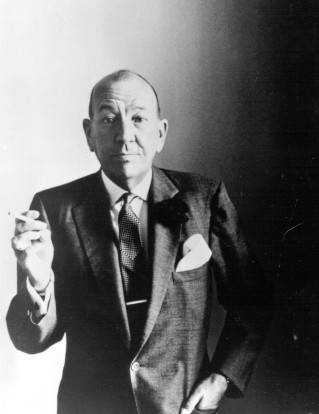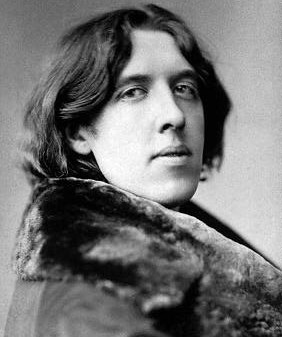|
It is perfectly monstrous the way people go about nowadays
saying things against one behind one's back that are absolutely
and entirely true.
- Oscar Wilde,
The Picture
of Dorian Gray (1890), Ch. 15
|
Wilde's persecution has made him something of an icon for
the modern gay community. In September 1997, a poll conducted
by a gay magazine listed him at number 2 in the top 500 lesbian
and gay heroes - curiously, first place went to Diana, Princess
of Wales, a person who would never have become a celebrity but
for her marriage.
But Wilde was, at best, a reluctant martyr. He did
not remain in England, proudly to confess his conduct and make
a political statement - he remained in England to perjure himself,
falsely denying on oath the acts to which he later admitted
in De Profundis, in the pathetic belief that his own intelligence
and wit would enable him to deceive the jury. He was no
more a martyr for gay rights than Bill Clinton was a martyr
for the cause of adultery, or of heterosexual men who choose
to take advantage of female subordinates in the workplace.
However, Wilde's notoriety as a convicted homosexual inevitably
led to his adoption as patron saint of the gay rights movement,
which began in the United Kingdom in the 1950s, but is now usually
thought of as an American phenomenon and dated to the Stonewall
riots in 1969. Wilde's trademark green carnation became
one of the first symbols adopted by homosexual men to identify
themselves, although latterly supplanted by the pink triangle
(adapted from the distinctive markings used to identify homosexual
prisoners in Nazi concentration camps), the rainbow pride
flag, the lambda symbol, and, more recently, the red AIDS awareness
ribbon.
This may well have surprised Wilde, because, when asked what
the green carnation signified, he replied: "Nothing whatever,
but that is just what nobody will guess". When a novel
was published anonymously with the title The Green Carnation
in 1894, satirising the relationship between Wilde and Bosie
Douglas, and Wilde was suspected of being its author, he wrote
to the Pall Mall Gazette:
I invented
that magnificent flower. But with the middle-class and
mediocre book that usurps its strangely beautiful name I have,
I need hardly say, nothing whatsoever to do. The flower
is a work of art. The book is not.
In fact, it was Wilde's successor as the most fashionable
playwright of his era - Noël Coward - who, in his 1929 musical
Bittersweet, publicised green carnations as a symbol of homosexuality,
with the lyrics:
Pretty boys,
witty boys,
You may sneer
At our disintegration.
Haughty boys,
naughty boys,
Dear, dear,
dear!
Swooning
with affectation ...
And as we
are the reason
For the Nineties
being gay,
We all wear
a green carnation.
Coward was not a particular fan of Oscar Wilde. In
his Diaries - not intended for publication during his lifetime
- Coward wrote:
I have read
the Oscar Wilde letters and have come to the reluctant conclusion
that he was one of the silliest, most conceited and unattractive
characters that ever existed. His love letters to Lord
Alfred Douglas are humourless, affected and embarrassing, and
his crawling letter from prison to the Home Secretary beneath
contempt. De Profundis is one long wail of self-pity.
It is extraordinary indeed that such a posing, artificial
old queen should have written one of the greatest comedies in
the English language. In my opinion it was the only thing
of the least importance that he did write.
Elsewhere in the Diaries, Coward wrote:
|

Sir Noël
Coward
|
Read the
unexpurgated De Profundis. Poor Oscar Wilde, what a silly,
conceited, inadequate creature he was and what a dread self-deceiver.
It is odd that such brilliant wit should be allied to
no humour at all. I didn't expect him to enjoy prison
life and to be speechless with laughter from morning till night,
but, after all, there are people even in gaol and he might have
had a little warm human joke occasionally, if only with the
warder. The trouble with him was that he was a 'beauty-lover'.
Read Maughan's Writer's Notebook. So clear and unpretentious
and accurate after that poor, podgy pseudo-philosopher.
The significant difference between Wilde and Coward, in terms
of their homosexuality, is that Coward practised both honesty
and discretion. Coward never married, and was apparently
faithful to his long-term male lovers. There are clues
to his homosexuality in much of his writing, but one has the
impression that these were "in" jokes intended for the amusement
of those who understood the references - nothing like Wilde's
heavy-handed allusions to homosexuality, particularly in Dorian
Gray, which appear almost as an unconscious attempt to "out"
himself. Coward lived most of his life under the same
legal regime as Wilde, but behaved with the kind of discretion
of which Wilde was seemingly incapable. Privately, he
expressed his views in these terms:
Any sexual
activities when over-advertised are tasteless, and for as long
as these barbarous laws exist it should be remembered that homosexuality
is a penal offence and should be considered as such socially,
although not morally. This places on the natural homo
a burden of responsibility to himself, his friends and society
which he is too prone to forget.
Coward welcomed the decriminalisation of homosexual conduct
in 1967, recording these thoughts in the Diaries:
The Homosexual
Bill has passed through the House of Commons with a majority
of fifty-five votes. I read the debate in the Telegraph.
Really some of the opposition speeches were so bigoted,
ignorant and silly that one can hardly believe that adult minds,
particularly those adult minds concerned with our Government,
should be so basically idiotic. However, now all will
be well apparently and the law will be changed at the next session.
Nothing will convince the bigots, but the blackmailers
will be discouraged and fewer haunted, terrified young men will
commit suicide.
Still, when encouraged to "out" himself in solidarity with
others of his sexual orientation, Coward declined to do so,
saying "There are still a few old ladies in Worthing who don't
know". It is not surprising that Coward's discretion and
sense of duty has made him much less fashionable than Wilde,
in circles of gay activism.
The landmark Wolfenden Report was published in 1957, recommending
the decriminalisation of homosexuality in the United Kingdom,
but the Government was slow to adopt the majority recommendations.
The situation was not assisted by the subsequent disclosure
that the son of the Committee's chair, John Wolfenden, was gay:
Wolfenden reportedly wrote to his son requesting "1) That we
stay out of each other's way for the time being; 2) That you
wear rather less make-up."
In the decade between the publication of the Wolfenden Report
and its legislative adoption, Oscar Wilde was trotted out as
a posthumous champion for the cause which he had so desperately
tried to convince three successive juries was not his own. It
is no coincidence that, in 1960, two different movies about
Wilde's life were released - the Robert Morley movie, and the
Peter Finch movie. Both were aimed squarely at shoring
up public opinion in favour of the Wolfenden recommendations.
One might think that a more natural champion for the gay
rights cause would have been a man like Alan Turing, the brilliant
mathematician, creator of the first working computer, and leader
of the code-breaking team at Bletchley Park which decrypted
the German "Enigma" code during the Second World War. In
1952, Turing was arrested after he reported to police the theft
of his wallet by a rent-boy whose services Turing had engaged.
Unlike Wilde, Turing made no perjured attempt to deny
the facts: he admitted his conduct, and sought only to argue
that what occurred between consenting adults, in the privacy
of his home, could not be characterised as indecent. He
was convicted and, offered the alternatives of a year's imprisonment
or chemical castration, opted for the latter. As the details
of his wartime work were still heavily classified, his immeasurable
contribution to the war effort - the huge number of British
and Allied lives saved through his code-breaking efforts, his
decisive contributions to victory in the Battle of Britain and
the Battle of the Atlantic, and the likelihood that he alone
advanced the Allied victory by as much as 12 months - could
not be taken into account on sentencing. He committed
suicide two years later.
Alternatively, if one looks for a more dashing and chivalrous
gay icon, numerous names spring to mind, from Alexander the
Great, to Richard the Lionheart, to Lawrence of Arabia. Then
again, if artistic talent is the criterion, surely Michelangelo
and Tchaikowsky have claims which at least equals Wilde's. Or
if pathos and tragedy are the necessary ingredients for a gay
hero, could there be a more awful story than that of Edward
II, King of England, who, after affairs with Piers Gaveston
and Hugh Dispenser, was agonisingly murdered at Berkeley Castle
in 1327 by the insertion of a red-hot poker through his rectum?
Yet it is Wilde, more than any other historical, literary
or artistic figure, who has become the standard-bearer of gay
activism. Though he never wrote a single line which was openly
supportive of homosexuality - though he lived a life of deceit
to his wife, family and friends - though he was so upset by
the mere suggestion that he posed as a homosexual, that he
prosecuted Queensberry for a libel which nobody else ever
read until Wilde himself chose to place it in the public domain
- though, through his counsel, he characterised homosexual intimacy
as "the gravest of all offences" - though, by his own sworn
testimony, he vehemently (and falsely) denied both the inclinations
and the acts for which he is now promoted as a champion - despite
all of this, he has been canonised as patron saint in the gay
Martyrology. Why ? Maybe because, at his first indecency trial,
the prosecutor Charles Gill - lacking either the finesse of
his leader (Carson) at the libel trial, or the aggression of
his leader (Lockwood) at the second indecency trial - offered
Wilde the opportunity to say something meaningful, rather than
something witty, flippant or shallow. Gill's seemingly innocuous
question - "What is 'the love that dare not speak its
name'?" - produced this remarkable ex tempore response, possibly
the profoundest thing Oscar Wilde ever uttered, and certainly
the most sincere remark that passed his lips throughout three
successive trials:
'The
Love that dare not speak its name' in this century is such
a great affection of an elder for a younger man as there was
between David and Jonathan, such as Plato made the very basis
of his philosophy, and such as you find in the sonnets of Michelangelo
and Shakespeare. It is that deep, spiritual affection that is
as pure as it is perfect. It dictates and pervades great works
of art like those of Shakespeare and Michelangelo, and those
two letters of mine, such as they are. It is in this century
misunderstood, so much misunderstood that it may be described
as the Love that dare not speak its name, and on
account of it I am placed where I am now. It is beautiful, it
is fine, it is the noblest form of affection. There is nothing
unnatural about it. It is intellectual, and it repeatedly exists
between an elder and a younger man, when the elder man has intellect,
and the younger man has all the joy, hope and glamour of life
before him. That it should be so, the world does not understand.
The world mocks at it and sometimes puts one in the pillory
for it.
|
A little sincerity is a dangerous
thing, and a great deal of it is absolutely fatal.
- Oscar Wilde,
The Critic
as Artist (1888)
|
|


.jpg)
